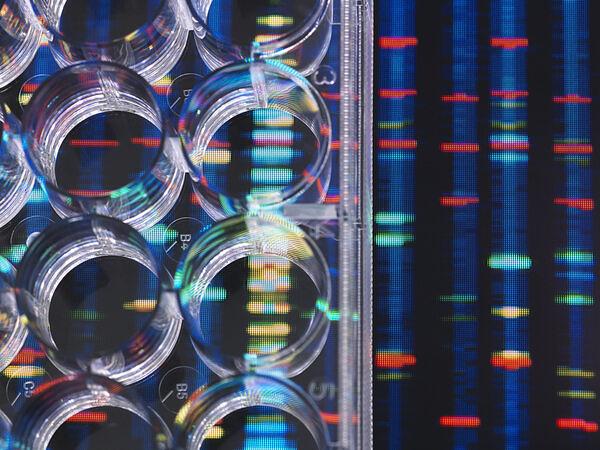 Molecular genetics, located at the nexus of biology, genetics, and remedy, represents a profound exploration into the complicated equipment governing life itself. It delves into the important gadgets of heredity, unraveling the complicated internet of molecular interactions that dictate an organism's developments, behaviors, and susceptibility to diseases. At its essence, molecular genetics scrutinizes the shape, function, and regulation of genes—those molecular blueprints encoded in the DNA strands that orchestrate the myriad biological strategies critical for life.
Molecular genetics, located at the nexus of biology, genetics, and remedy, represents a profound exploration into the complicated equipment governing life itself. It delves into the important gadgets of heredity, unraveling the complicated internet of molecular interactions that dictate an organism's developments, behaviors, and susceptibility to diseases. At its essence, molecular genetics scrutinizes the shape, function, and regulation of genes—those molecular blueprints encoded in the DNA strands that orchestrate the myriad biological strategies critical for life.
Illuminating the course in the direction of deeper facts of genetic illnesses, their underlying mechanisms, and their capacity for therapeutic interventions. By dissecting the molecular underpinnings of genetic troubles, researchers and clinicians alike attempt to release the secrets and strategies held within the human genome, decoding the complex code that dictates fitness and disease. Through meticulous examination of gene expression patterns, mutations, and regulatory mechanisms, molecular genetics gives valuable insights into the origins of sicknesses and paves the way for precision medicine strategies tailored to character patients' genetic make-up.
Molecular genetics encompasses taking a look at DNA, RNA, and proteins on the molecular level to resolve the genetic code that governs all living organisms. It involves strategies and methodologies aimed toward analyzing and manipulating genetic fabric to advantage insights into the mechanisms underlying natural phenomena. The insights provided by molecular genetics have revolutionized the prognosis, remedy, and prevention of illnesses. By figuring out genetic versions associated with precise situations, molecular genetics permits healthcare specialists to tailor interventions to personal patients, major to greater powerful effects, and advanced affected person care.
 Fundamentals of Molecular Genetics
Fundamentals of Molecular Genetics
At the coronary heart of molecular genetics lies a charming exploration into the very essence of lifestyles—our genetic code. This subtopic embarks on a journey to get to the lowest of the foundational requirements that underpin molecular genetics, delving into the difficult mechanisms governing the transmission, expression, and law of genes. Fundamentally, molecular genetics seeks to decode the language of DNA, interpreting the genetic commands that dictate the tendencies and developments of all residing organisms.
Central to understanding molecular genetics is grasping the shape and feature of DNA—the molecule of heredity. Through the elucidation of DNA's double helix shape and the complementary base pairing that governs its replication, molecular genetics unravels the terrific precision via which genetic facts are transmitted from one technology to the following. Moreover, this subtopic ventures into the region of gene expression, exploring the complex techniques of transcription and translation through which genetic facts are decoded into sensible proteins crucial for existence's myriad strategies. By uncovering the ones vital mechanisms, molecular genetics lays the foundation for interpreting the complexities of genetic diseases and devising targeted interventions to mitigate their effect on human health.
A. DNA Structure and Function
DNA, or deoxyribonucleic acid, is the hereditary fabric that contains genetic records in all residing organisms. Its double helix structure, composed of nucleotide constructing blocks, presents the blueprint for the improvement, increase, and functioning of cells.
B. Genetic Variation and Mutation
Genetic version arises from variations in DNA sequences amongst individuals inside a populace. Mutations, or alterations in DNA series, can occur spontaneously or be triggered by outside factors which include radiation or chemicals, predominant to genetic range and the usage of evolutionary strategies.
C. Gene Expression and Regulation
Gene expression refers to the system through which facts encoded in DNA are transformed into functional molecules, consisting of proteins or RNA molecules. Gene regulation mechanisms control the timing, place, and stage of gene expression, making sure right cellular function and development.
Techniques in Molecular Genetics
Techniques empower scientists to probe the intricacies of the genetic code, unraveling its mysteries and unlocking worthwhile insights into health and illness. This subtopic ventures into the place of laboratory methodologies and modern-day technology that electricity the arena of molecular genetics ahead. From conventional strategies like polymerase chain reaction to advanced genome enhancing equipment, this exploration navigates the panorama of molecular genetic techniques with precision and intensity.
At the main edge of molecular genetic strategies lies PCR, an innovative method that amplifies precise DNA sequences, permitting their detection and evaluation with remarkable sensitivity. Moreover, this subtopic delves into the arena of DNA sequencing, dropping moderates in the next-generation sequencing era that facilitate the fast and comprehensive assessment of complete genomes or targeted gene regions. Through elucidating the concepts and packages of those techniques, this subtopic illuminates the progressive equipment that improves electricity improvements in molecular genetics and paves the way for groundbreaking discoveries in biomedicine.
A. Polymerase Chain Reaction
PCR is a broadly used technique for amplifying specific DNA sequences, permitting researchers to generate large portions of DNA for in addition analysis. This technique has packages in various regions, such as genetic checking out, forensics, and biomedical studies.
B. DNA Sequencing
DNA sequencing includes figuring out the precise order of nucleotides in a DNA molecule, imparting precious information about genetic version, mutations, and gene features. Next-technology sequencing era has revolutionized the sector with the aid of allowing speedy and fee-powerful sequencing of entire genomes.
C. Gene Editing Technologies
Gene modifying technology, permit particular change of DNA sequences, supplying fantastic opportunities for analyzing gene characteristic, correcting genetic defects, and growing novel recuperation techniques for genetic troubles.
Applications in Biomedicine
Molecular genetics in biomedicine transforms healthcare with the aid of uncovering ailment mechanisms, diagnosing genetic disorders, and tailoring therapies to patients. It elucidates inherited conditions and complex illnesses like cancer, unraveling molecular intricacies for progressed knowledge and treatment.
Across scientific genetics, oncology, pharmacogenomics, and regenerative remedy, molecular genetics identifies illness-inflicting mutations, stratified patients based totally on genetic profiles, and advances precision medicine. It drives biomedical research, coming across healing objectives, disease prognosis biomarkers, and gene-based treatments for greater affected character care.
A. Disease Diagnosis and Genetic Testing
Genetic trying out lets in the identity of genetic versions related to inherited illnesses, contemplating early detection, chance assessment, and customized control techniques. Molecular diagnostics play a crucial feature in diagnosing genetic problems, predicting illness susceptibility, and guiding treatment picks.
B. Pharmacogenomics and Personalized Medicine
Pharmacogenomics examines how genetic variations have an impact on individual responses to medicinal pills, guiding the choice of medication and dosages tailored to sufferers' genetic profiles. Personalized medication strategies leverage molecular genetics to optimize treatment consequences, restrict unfavorable consequences, and enhance affected character adherence.
C. Gene Therapy and Genetic Engineering
Gene remedy ambitions to deal with or save you illnesses thru introducing genetic cloth into cells to correct genetic defects or modulate gene expression. Advances in molecular genetics have paved the way for contemporary gene therapy strategies targeting a huge variety of problems, together with genetic illnesses, most cancers, and infectious diseases.
Ethical Considerations and Challenges
As molecular genetics continues to strengthen, it brings forth profound moral issues and multifaceted demanding situations. Ethical dilemmas stand up regarding privacy, consent, and the equitable distribution of genetic data as technology evolves and genetic understanding expands. These considerations intersect with societal values, felony frameworks, and cultural norms, shaping the responsible exercise of molecular genetics in studies and healthcare.
Moreover, technical and logistical demanding situations abound in molecular genetics, from ensuring the accuracy and reproducibility of genetic testing to handling sizable amounts of genomic information securely. Interpretation of genetic versions, particularly those of unknown significance, requires careful attention and knowledge to keep away from misinterpretation and mismanagement.
A. Ethical Issues in Genetic Testing
Genetic trying out presents ethical dilemmas associated with privacy, confidentiality, knowledgeable consent, and the capacity for discrimination based on genetic statistics. Ensuring autonomy, beneficence, and justice inside the use of genetic testing requires sturdy moral frameworks and regulatory oversight.
B. Challenges in Genome Editing
The use of gene enhancing technologies, inclusive of CRISPR-Cas9, raises concerns about off-target outcomes, unintentional outcomes, and the capability for misuse or abuse. Ethical considerations surrounding germline modifying, genetic enhancement, and the equitable distribution of gene therapies necessitate thoughtful deliberation and responsible governance.
C. Genetic Privacy and Data Security
The growing availability of genetic data raises worries about privacy breaches, data protection, and the unauthorized use of genetic data. Safeguarding genetic privacy calls for sturdy records protection measures, transparent consent methods, and policies to save you from misuse or exploitation of genetic records.
Future Perspectives and Emerging Trends
Molecular genetics continues to comply at a fast tempo, it gives glimpses right into a future filled with groundbreaking discoveries and transformative enhancements. Emerging traits inside the area convey promising improvements that keep the capability to revolutionize biomedicine and healthcare. From novel gene improving techniques to advancements in customized treatment, the destiny of molecular genetics is poised to redefine our know-how of genetics and its applications.
In this section, we explore the future perspectives and emerging traits in molecular genetics, delving into the modern-day era and paradigm shifts which can be reshaping the panorama of genetic studies and scientific exercise. By staying abreast of those tendencies, researchers, clinicians, and policymakers can count on and prepare for the transformative effect of molecular genetics on biomedicine and society.
A. Precision Genomics and Precision Medicine
Advances in molecular genetics are using the transition closer to precision genomics and personalized treatment, wherein remedy choices are tailored to people' genetic profiles, life, and environmental factors. Precision medicine initiatives leverage genomic information to optimize ailment prevention, analysis, and remedy techniques.
B. Genomic Medicine and Population Health
Genomic medicine tasks purpose to combine genomic records into ordinary medical care to enhance health outcomes and populace fitness. Population-based genomic screening packages, precision public fitness interventions, and genomic epidemiology techniques preserve capacity for addressing health disparities, preventing illnesses, and promoting well being on a global scale.
C. Technological Innovations and Disruptive Technologies
Technological innovations, collectively with unmarried-cell sequencing, spatial transcriptomics, and artificial biology, are reshaping the landscape of molecular genetics studies and applications. Disruptive technology have the capacity to release new insights into organic complexity, illness mechanisms, and healing goals, accelerating development toward precision healthcare solutions.
